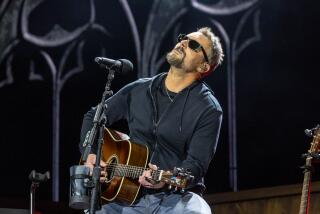The Dylan of Lebanon spreads a message of peace
This is not an easy time to be the musical voice of Lebanon. Marcel Khalife, who was born in a small seaside village about 25 miles from Beirut, has been singing and playing Lebanese popular and classical music for some 40 years and is the country’s most respected singer and composer.
In 2005, UNESCO named him an International Artist for Peace. And yet, having toured the world, he is well aware that the only thing most people outside the Middle East know about his homeland is its recent history of war and ethnic strife.
“That is very hard,” Khalife says, speaking in French from a European tour stop. “They always write about that, and if there is also beauty, they do not write about it. . . . Not only in Lebanon but in the whole region, there are great traditions of music, of poetry, of song, of performance, and it is too bad that the media sees only war.
“It was not us who started these wars; they came from outside, with colonization. So we need to say ‘No’ -- no to war. That is what I hope to do with my concerts: to give a different view of the region, another vision of the culture.”
Khalife, who appears Saturday at the Wilshire Ebell Theatre, has loved music since his childhood. Born in 1950, he is from a family of Maronite Christians and his first musical inspiration was in church: “I would hear the canticles, and I loved this sound,” he recalls. “Because of that I became interested in music. And there was also beautiful music in the mosques.”
He says that his family encouraged his interest: “My grandfather played a sort of flute called the ney, and he sang as well. In the beginning, I used to tap out rhythms on tables, on empty milk cartons. Then my parents bought me an instrument, an oud -- the Oriental lute -- and I started to study music.”
Khalife went to the Lebanon National Higher Conservatory of Music in Beirut, where he studied Arabic and Western classical styles, and immersed himself in a thousand years of poetry and song. By 1970 he was teaching there, and in 1976 he formed the Al Mayadine Ensemble, and began to tour the world.
But Khalife’s reputation is based on more than just his music. He has often been called “the Bob Dylan of Lebanon” for his songs on topical themes and his passionate avowal of the rights of Palestinian refugees. He is considered a hero by many fans for continuing to perform even during the worst years of warfare, appearing in bombed concert halls in spite of personal threats and omnipresent dangers.
“Life doesn’t stop just because there is a war,” he says. “Of course it is difficult, but art survives. Nobody can kill the dream of art, so one goes on, and one tries to work for peace.”
Though he has not moderated his political stances, for the last dozen years Khalife has changed his musical focus, devoting virtually all his energy to extended instrumental compositions.
He recently premiered a work in Italy for full symphony and choir, and his current tour will balance his older songs with extracts from a new suite, “Taqasim,” a composition for oud, percussion and double bass. (Extracts can be seen and heard on his website: www.marcelkhalife.com.)
It is easy to see this as a return to his classical, conservatory roots, but Khalife says that the whole idea of calling one sort of music popular and another classical disturbs him. “I like music to be open, like life,” he says. “The sun is the sun, it warms everybody.
“After all,” he continues, “what is classical music? All the great composers, all over the world, have been inspired by popular music.”
Nonetheless, it can be hard to maintain a broad, viewpoint in a world more divided -- by politics, by religion -- every year.
Over the course of his career Khalife can take beleaguered pride in having been censored and attacked by Muslims, Christians and Jews, both at home and abroad. He has been banned from Tunisia, denounced by the parliament of Bahrain, and put on trial in Lebanon for using a passage from the Koran in a song about the plight of the Palestinians.
Just last month, he was forced to change the venue of his San Diego appearance after owners of the hall he’d been booked into decided that the group presenting him might be too controversial.
Still, he insists that at a deeper level none of this can affect him.
“One has to be optimistic. Because I look at the politicians who have done all this harm, and I think, ‘They are nothing.’ They know nothing of the philosophy of life, the philosophy of love. That is what matters. We have to be rich within ourselves. For me, I feel that art nourishes my spirit. Music gives me peace, inside myself, whatever may be happening around me.”
--
Marcel Khalife
Where: Wilshire Ebell Theatre, 4401 W. 8th St., Los Angeles
When: Saturday, 8 p.m.
Price: $25 to $50
Contact: (323) 939-1128
More to Read
The biggest entertainment stories
Get our big stories about Hollywood, film, television, music, arts, culture and more right in your inbox as soon as they publish.
You may occasionally receive promotional content from the Los Angeles Times.






